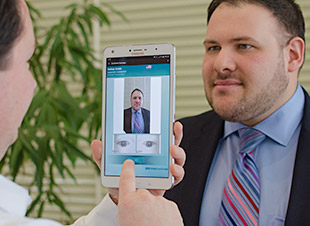Custom Samsung Galaxy Tab Pro 8.4 To Include Advanced Iris Recognition For B2B Applications

Biometrics authentication systems such as fingerprint readers have existed for some time even in consumer products such as laptops or phones. However, it wasn't until Apple implemented Touch ID on its mass market iPhone 6 that many other companies showed significant interest in implementing biometrics technologies in their devices.
Samsung is one of the first companies to start taking this biometrics trend seriously. Initially, the Galaxy S5 had a fingerprint reader that used old technology and didn't work quite well. Now, the Galaxy S6 will arrive with an improved touch-based reader that's on par with the iPhone 6.
Samsung doesn't seem willing to want to stop here, though. The company has now signed an exclusive licensing contract with SRI International, a non-profit research center that creates technology for companies or the government, that would give Samsung access to an advanced iris recognition technology, called "Iris on the Move" (IOM).
According to SRI International, the iris recognition is so fast that users don't even have to stop and look at the camera; they can just "glance and go." The company also said that this iris-based solution is 1,000 times more accurate than published fingerprint data.
"The next-generation IOM iris recognition solution will create new applications and markets and increase adoption in existing markets," said Mark Clifton, president of Products and Solutions at SRI International.
SRI only mentioned the technology being used by Samsung for B2B applications, so it's likely we won't see it in Samsung's mainstream devices soon. Instead, Samsung will probably only sell a custom Galaxy Tab Pro 8.4 to enterprise customers who want to benefit from additional security through more advanced and easier-to-use biometrics authentication systems.
Although iris or facial recognition solutions may be more advanced in identifying the uniqueness of an individual, there's one thing that separates them from fingerprint-based readers: Attackers may be able to extract the same data from images of the target found online. Most people have orders of magnitude more pictures that includes their faces than they do of their palms.
Get Tom's Hardware's best news and in-depth reviews, straight to your inbox.
What's somewhat reassuring, though, is that if this iris-based solution is indeed 1,000 times more detailed than typical fingerprint data, that could put the technology significantly ahead of hackers who simply use online photos to hack into the iris-protected system.
Follow us @tomshardware, on Facebook and on Google+.
-
ethanolson What Samsung is doing here makes sense. Security has a few key principles:Reply
1.who you are 2.what you have 3.what you know 4.where you are -
Thorz Dear Enterprise User, Forget Samung as a tablet supplier. The tech giant has all but forgotten its premium Galaxy Note 10.1 buyers stuck in Android 4.1.2 limbo and now unable to access apps due to the lagging/nonexistant Android updates. Look to another reputable supplier and avoid the software challenged Samsung frustration.Reply -
3ogdy Good. I know whose products I won't buy. And F! your excuses for implementing this, Samsung. This is only for cops to identify us more quickly and easily.Reply
